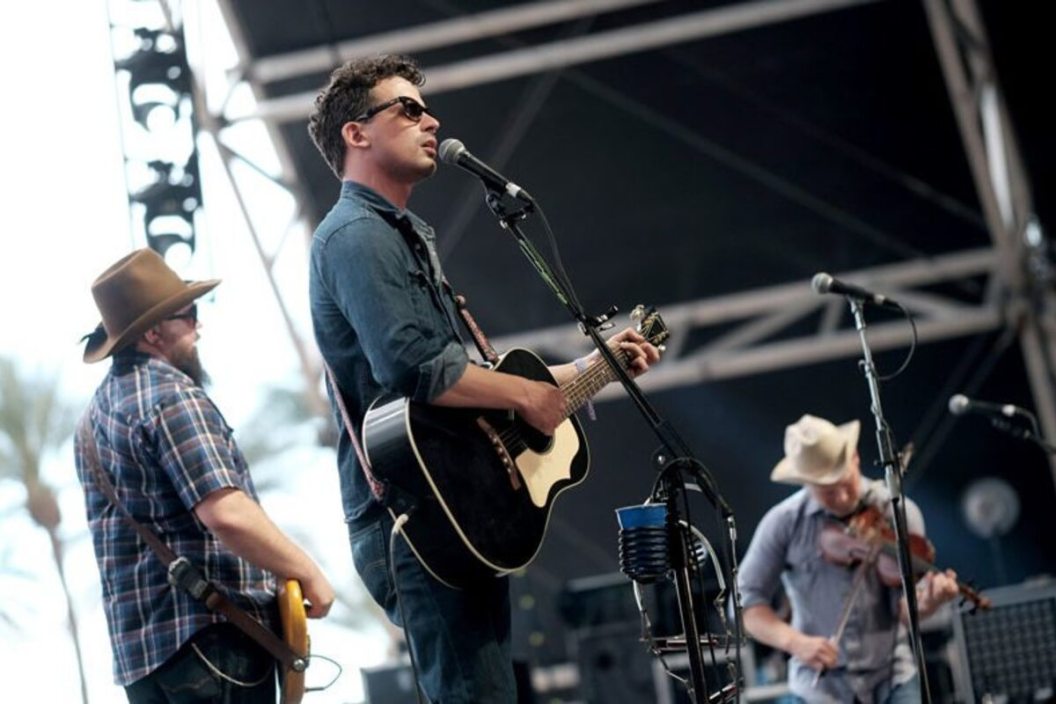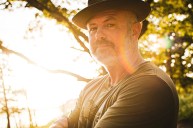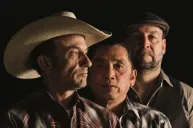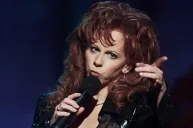In the new book Red Dirt: Roots Music Born in Oklahoma, Raised in Texas, At Home Anywhere, Josh Crutchmer traces Red Dirt music from its origins in Stillwater, Oklahoma to a coast to coast phenomenon. The Oklahoma-raised journalist set out to write the definitive history of the Red Dirt music scene, encompassing the genre's forefathers, the nationwide breakout stars and the artists who're carrying the music into the next generation.
The book includes interviews with the Turnpike Troubadours, Stoney LaRue, Randy Rogers, Wade Bowen, Cody Canada, Jason Boland, Mike McClure, Reckless Kelly, Jamie Lin Wilson and Garth Brooks, who credits some of the genre's forefathers for his own superstar country career.
Below, read Wide Open Country's Q&A with Crutchmer.
This interview was edited for length and clarity.
Wide Open Country: Writing the history of a genre is a huge labor of love — what inspired you to take on this endeavor and write Red Dirt?
Josh Crutchmer: I think the thing for me was I came from the scene and I was a part of it and I knew that even way back in 2000 or 2001, when I was in college and kind of writing for the college paper...I fell in with Ragweed boys [Cross Canadian Ragweed] and Stoney [LaRue] also Jason Boland. They really introduced me to everybody in the scene. And at some point, when you develop a tie to Red Dirt, it's kind of just natural to ask if there's something you can do to give back to it. It did a lot for me. So once I left college and it was apparent that I wasn't going to become just a full time music writer — that I was going to be in journalism, but my role would be elsewhere, I kind of walked away knowing that I would find a way to someday come back and tell the story of the scene. So it's been on my mind literally for 18 or 19 years now. Every now and then over that little time period, there have been moments where I felt like there wasn't enough being said about the scene... Ragweed obviously comes to mind. I was at the Chicago Tribune then and one of the few times I actually did sit down and write about Red Dirt was a piece that ended up on their site. It's still out there today. [It's] what I thought at the time to be the definitive farewell to Ragweed. So that happened. And then, you know, as time passes, you start to lose some icons like Tom Skinner and Brandon Jenkins and that sort of compounds.
I started thinking...that it was really time [to tell the story] before we lost anybody else. We just had a really good group that could get the word out. It would be time to tell it. At first I wanted to do a documentary. I guess about two years ago, I was at a concert. It was with Cody Canada at Eskimo Joe's in Stillwater. Somebody pulled me aside and it was John Cooper of The Red Dirt Rangers. He said, 'Man, the time has come to tell the story.' He said 'If you don't do it, no one's gonna do it.' That's kind of when I just dove in and said 'This has got to get out and I'm going to let the artists talk, but I'm going to fashion their story into something that everybody can read, whether you're brand new to Red Dirt or whether it's been a part of your life for even longer than mine.'"
WOC: Was there a particular band or song that made you fall in love with Red Dirt music?
JC: I grew up in small town Oklahoma, where you were either alt rock, which I tried to be but I really wasn't, or you were country, which I definitely was. It was '90s country — the Garth Brooks era, Mark Chesnutt and, by the time I was turning 20, the Dixie Chicks were taking flight. That was kind of all I knew. And then by happenstance, I ended up at a Great Divide concert... I ended up at one of their shows. I heard them on the radio because they had gotten an Atlantic Records deal at that time and I thought they sounded cool. I went to their show and liked it, but they came out for an encore and did "The Road Goes on Forever." It was the first time I'd ever heard it. It just was so different. They were just covering Robert [Earl Keen] to please their fans, but I had never heard anything like it and didn't even know what the song was. It was early dial-up internet days and it wasn't easy to do your own research. It really took like two or three years before I figured out what the hell I had even been listening to. By the time I figured it out, I was living in Stillwater where they had a wonderful music store. I took sort of remembering that song and that led me to a Number 2 Live Dinner. Then that led me to a section of the music store called local artists, where there was very early Ragweed and the Great Divide. Not long after that, I turned 21 and just started seeking out local live music in Stillwater anywhere I could. And it turns out there was a lot of it.
WOC: Can you talk about Garth Brooks' connection to the Red Dirt scene?
JC: Garth went to Oklahoma State in the first half of the 1980s and was just a college kid. He played around town and on campus and off campus and got into the bars. He wasn't a big part of it, but he was laser focused on his own music. It just so happened that that was right when the earliest earliest group of Red Dirt forefathers...were established. That included Tom Skinner and Bob Childers and a guy named Greg Jacobs, who was a songwriter. Garth wanted to play in that town and if you wanted to play in the town, you had to know who those people were. So they're playing the same places and sometimes Garth would play and the Red Dirt Rangers would show up in the crowd or Tom Skinner would and sometimes vice versa. What that ultimately led to was when Garth put the band together...that band was called Santa Fe and it was Tom Skinner, two of Tom Skinner's brothers and just a bunch of Stillwater musicians. They were all very, very hardcore Red Dirt. So they're in his band, especially Tom Skinner. Then he also goes to Nashville to seek out his way and his life. Bob Childers by happenstance is living there. And Bob Childers is another Red Dirt forefather and Bob Childers lets the whole band stay at his house and on his couch and introduces him to all of the people in Nashville that go on to establish his career. At one point in the book, Garth says explicitly, 'If there were not Bob Childers, they would be no Garth Brooks.' ... Garth is very open about his story and his music and he's doing some sort of anthology thing where he writes a book a year. So when I approached him, I didn't really think he'd be interested because I thought I'd be cribbing from what he was doing. But it turns out it was such a part of his past that he really couldn't justify covering it in his own way...He was really gung-ho to talk about these artists.
Just speaking to him was the same guy you see on stage — that very disarming and intimate character and this voice. You just feel as if he's talking directly to you. So when I'm asking him about all of these people in his history and Stillwater, he's talking to me the same way he talks to a crowd [from] onstage. He's just very into the moment and very excited and very passionate about these people from his life.
WOC: Could you talk about the Texas and Oklahoma connection? It seems like there's a friendly rivalry between Texas and Oklahoma — except when it comes to music. Then they're on the same page.
JC: Honestly, it was not always like that. There was a time when there was a little bit of a true rivalry. It was kind of Texas-sided because Texas was the market. Texas had the venues and the people and the fans. Oklahoma musicians wanted to play there... Some of the more extreme [Texas musicians] would throw in lyrics like 'they ought to put up a wall at the Red River.' That's a little bit ironic now...
But some things happened. One, the Great Divide made inroads in New Braunfels with the help of a Mattson Rainer at KNBT radio. They began headlining some of their early festivals and that led to them winning over crowds first in New Braunfels, and then Stephenville and then Amarillo and Lubbock. Ultimately, the Divide holds a huge festival in Stephenville. And after that it was just that Ragweed and Stony [LaRue] and [Jason] Boland were just so good that you had to bring those barriers down. When Ragweed really lit their fuse and took off it was Pat Green who would carry them into Nashville. He was the one that had the first Universal deal and he was the one that put in the words for them. When some tragedies befell that band, it was Pat Green who reached out and really made life easier for them. A lot of people really call that the 'before and after.'
Since then, what has happened is some of those Oklahoma artists just got so good that they couldn't be ignored. They were headlining in Texas. They would call themselves Red Dirt and the Texas musicians would call themselves Texas. Well, if if you work in marketing or radio or media, are you going to just always make a distinction? It was just kind of natural that once a scene is successful, it kind of has to be marketed. And the best way and the most convenient way for that to appeal was to stop treating it as if it were separate from Texas music. That's how the two phrases ran together. It was really important in the book to me to do two things with that. One, say that and make it clear that there was the whole Texas music scene that was always going to happen and be successful with or without Red Dirt. I mean, Pat Green was going to be in his stratosphere no matter what happened. But what also needed to be understood was that a lot of what is Texas music now is a result of the migration of those Red Dirt artists and the friendships and relationships they built with Reckless Kelly with Wade Bowen and Randy Rogers and a handful of others that are really integral parts to this book. Without those Texans, the story of Red Dirt isn't complete because where it is now is not Stillwater, Oklahoma. Where it is is all over the world. You can say Red Dirt and people at least will picture what the genre is.
WOC: You interviewed Evan Felker [of the Turnpike Trouabadours] just before the book went to print. Could you talk about why it was important to update their story?
I had a really good interview with Turnpike. I got them all together as a band at Medicine Stone in 2018 and just chatted them up and it was great. It was insightful. They talked about their backstory and what motivates them now. And it was a really good chapter. But writing this book while they're going through hell as a band — I didn't really just want to leave it at that story I got in September 2018. That sort of seemed unfair. So I tried just writing around it... I told their story and got into all the things they said in those interviews, but I would always come back to where they are now, which was not playing. And that just seemed dated, very 2019. And this was 2020 and I felt like the world had moved on. So I really, really committed myself to trying to write a better ending — not just for myself and for the book, but out of respect for them.
[Ed note: Crutchmer sent a copy of the book to Felker and shortly before the book went to print, Crutchmer interviewed the Turnpike Troubadours frontman about finding sobriety and writing new music. The band went on hiatus in 2019.]
I talked to Evan and I was expecting metered and careful. He was just honest and, frankly, just in a great mood and really happy. I just ran with that. I let him talk and tried not to interrupt him and really tried to keep as much of what he said... He was talking about sobriety, he talked about wanting to write songs again. He said, 'I want to write music, but if I hadn't taken this year off and realized that all I'm good at is making music, I don't know that I'd be here right now.' It was just a wonderfully candid and honest hour on the phone with him. When I read it now I feel like that is a good place to leave their story...I know people went crazy and sort of made all sorts of assumptions when it actually came out that Turnpike's releasing an album...Fans do what they do. But when you actually read it, it's a little more measured than that. I think the headline you take away is Evan Felker is happy, he's married and he wants to make music. And that in all likelihood is going to involve the people he wants to make music with. So they all have to get back to that spot. Some of his band members are in other bands now, so there was never going to be just a flipping of a switch, but in some ways I thought it made for a better story that way.
WOC: Is there a certain way that you define Red Dirt music?
JC: I do think that the traits of Red Dirt are honest songwriting...but it's really important that you pair that honest song writing with a good melody and good music. I think Turnpike is a great example. When you listen to a Turnpike song, without them ever saying it or rarely saying it, if you've been to Oklahoma and you've been to the part of the country where the dirt roads actually are red, when you hear them singing, that's what you picture. So if you hear your Turnpike singing about bird hunters or going back to Cherokee County, what pops into your head is: there's an Oklahoma landscape in there...So you do know it when you see it, but the reason you know it when you see it is because where it takes your mind and what kind of an overall experience you get out of it. It really places you back around campfires in rural Oklahoma when you get down to it — in a really fun way.
Now Watch: Willie Nelson's Children Are Carrying On His Legacy




